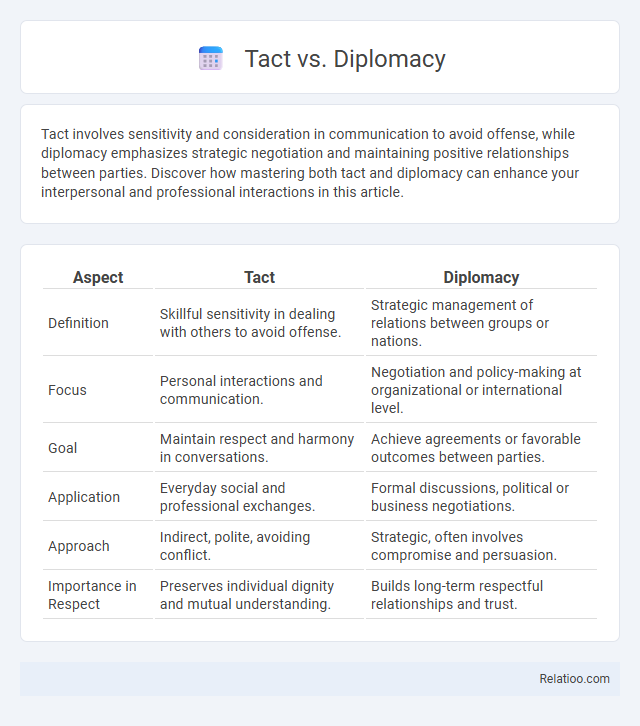Tact involves sensitivity and consideration in communication to avoid offense, while diplomacy emphasizes strategic negotiation and maintaining positive relationships between parties. Discover how mastering both tact and diplomacy can enhance your interpersonal and professional interactions in this article.
Table of Comparison
| Aspect | Tact | Diplomacy |
|---|---|---|
| Definition | Skillful sensitivity in dealing with others to avoid offense. | Strategic management of relations between groups or nations. |
| Focus | Personal interactions and communication. | Negotiation and policy-making at organizational or international level. |
| Goal | Maintain respect and harmony in conversations. | Achieve agreements or favorable outcomes between parties. |
| Application | Everyday social and professional exchanges. | Formal discussions, political or business negotiations. |
| Approach | Indirect, polite, avoiding conflict. | Strategic, often involves compromise and persuasion. |
| Importance in Respect | Preserves individual dignity and mutual understanding. | Builds long-term respectful relationships and trust. |
Understanding Tact and Diplomacy
Understanding tact involves recognizing and respecting others' feelings to communicate sensitively, whereas diplomacy emphasizes managing relationships and negotiations to achieve peaceful outcomes. You can improve your interpersonal skills by distinguishing tact's focus on personal sensitivity from diplomacy's strategic approach in complex social or political contexts. Mastering both ensures effective communication and conflict resolution in diverse situations.
Key Differences Between Tact and Diplomacy
Tact involves sensitivity in dealing with others to avoid offense, emphasizing personal interactions and emotional intelligence, while diplomacy refers to the skillful management of international relations or negotiations between groups, focusing on strategy and political acumen. Your ability to use tact helps maintain harmony in everyday conversations, whereas diplomacy is crucial for resolving conflicts and achieving long-term agreements at organizational or governmental levels. Understanding these distinctions ensures you apply the right approach in social settings versus formal negotiations.
The Importance of Tact in Communication
Tact in communication involves sensitivity and consideration to express opinions without causing offense, enhancing interpersonal relationships and collaboration. Diplomacy often refers to managing international or formal relations with skillful negotiation and tactful dialogue, while tact specifically emphasizes the nuanced delivery of messages to avoid misunderstandings or conflict. Mastering tact ensures effective communication, fosters trust, and promotes positive interactions in both personal and professional settings.
The Role of Diplomacy in Conflict Resolution
Diplomacy plays a crucial role in conflict resolution by facilitating communication and negotiation between opposing parties to reach a peaceful agreement. While tact involves careful consideration of others' feelings and diplomacy requires strategic engagement at a broader level, effective diplomacy combines both skills to foster mutual understanding and cooperation. You can enhance conflict resolution outcomes by developing diplomatic skills that balance respect, patience, and persuasive dialogue.
Situations Requiring Tactful Approaches
Situations requiring tactful approaches often involve sensitive conversations, conflict resolution, or delivering constructive criticism where emotions run high and relationships are at stake. Your ability to employ tact ensures communication is respectful and considerate, preventing misunderstandings while maintaining trust and professionalism. Diplomacy plays a crucial role in negotiation and international relations by balancing competing interests and fostering cooperation through strategic, tactful dialogue.
Practicing Diplomacy in Professional Settings
Practicing diplomacy in professional settings requires balancing tact and strategic communication to maintain positive relationships and resolve conflicts effectively. Your ability to employ diplomacy involves active listening, empathy, and choosing words carefully to navigate sensitive situations without causing offense. Mastering these skills enhances collaboration, builds trust, and promotes a productive work environment.
Common Mistakes in Tact and Diplomacy
Common mistakes in tact and diplomacy include confusing the two concepts, where tact focuses on sensitivity in communication to avoid offense, while diplomacy encompasses strategic negotiation and relationship management. People often mistake blunt honesty for tact, ignoring the importance of emotional intelligence in delivering messages thoughtfully. Another frequent error is assuming diplomacy means avoiding conflict altogether, whereas effective diplomacy involves addressing issues delicately to reach mutually beneficial outcomes.
Strategies for Balancing Tact and Diplomacy
Balancing tact and diplomacy requires understanding their distinct functions: tact involves sensitivity in communication to avoid offense, while diplomacy focuses on managing relationships and negotiations effectively. Employing strategies like active listening, empathy, and clear articulation enhances the capacity to navigate complex social dynamics thoughtfully and strategically. Prioritizing mutual respect and situational awareness enables individuals to address conflicts constructively while maintaining positive interpersonal connections.
Benefits of Mastering Tact and Diplomacy
Mastering tact and diplomacy enhances interpersonal communication by fostering respect and understanding, crucial for resolving conflicts and building strong relationships. These skills improve negotiation outcomes by enabling individuals to address sensitive issues delicately, ensuring mutual benefit and long-term cooperation. Proficiency in tact and diplomacy also boosts professional reputation and leadership effectiveness, creating a positive environment that encourages collaboration and trust.
Developing Tact and Diplomacy Skills
Developing tact and diplomacy skills enhances your ability to communicate effectively and manage interpersonal relationships with sensitivity and respect. Tact involves careful consideration of others' feelings when expressing your thoughts, while diplomacy requires strategic negotiation and conflict resolution to maintain harmony. Mastering these skills helps you navigate complex social and professional situations, fostering trust and collaboration for successful outcomes.

Infographic: Tact vs Diplomacy
 relatioo.com
relatioo.com